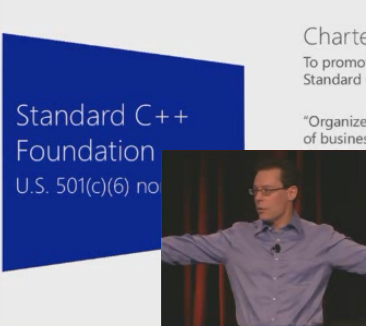Post-Portland mailing available
The post-Portland mailing is now available. It includes meeting minutes, updated issues lists, and the papers adopted at this meeting (among other papers).
Of particular note is the Evolution Working Group paper status, now present again and maintained by Ville Voutilainen. Thanks, Ville!
| WG21 Number | PL22.16 Number | Title | Author | Document Date | Mailing Date | Previous Version | Subgroup | Disposition |
|---|---|---|---|---|---|---|---|---|
| SD-1 | 12-0000R3 | 2012 PL22.16/WG21 document list | Clark Nelson | 2012-11-03 | 2012-11 | |||
| SD-2 | 12-0001R2 | ISO WG21 and INCITS PL22.16 membership list | Clark Nelson | 2012-09-12 | 2012-09 | |||
| SD-3 | SC22/WG21 (C++) Study Group Organizational Information | Herb Sutter | 2012-10-04 | 2012-09 | ||||
| SD-5 | WG21 and PL22.16 (C++) Joint Mailing and Meeting Information | Herb Sutter | 2010-09-20 | 2012-09 | ||||
| N3453 | 12-0143 | Minutes, WG21 Teleconference 2012-10-5 | Kyle Kloepper | 2012-10-5 | 2012-11 | |||
| N3454 | 12-0144 | Minutes, WG21 Meeting No. 54, 15-19 October 2012 Portland, Oregon, USA | Kyle Kloepper | 2012-11-3 | 2012-11 | |||
| N3455 | 12-0145 | Minutes, PL22.16 Meeting No. 59, 15-19 October 2012 Portland, Oregon, USA | Kyle Kloepper | 2012-11-3 | 2012-11 | |||
| N3456 | 12-0146 | Range arguments for container constructors and methods, with wording | Jeffrey Yasskin | 2012-11-03 | 2012-11 | Library | ||
| N3457 | 12-0147 | Algorithm std::iota and its modifications. | Vladimir Grigoriev | 2012-10-30 | 2012-11 | Library | ||
| N3458 | 12-0148 | Simple Database Integration in C++11 | Thomas Neumann | 2012-10-22 | 2012-11 | Library | ||
| N3459 | 12-0149 | Comparison of Two Database Access Methodologies | Bill Seymour | 2012-10-13 | 2012-11 | Library | ||
| N3462 | 12-0152 | std::result_of and SFINAE | E. Niebler, D. Walker, J. de Guzman | 2012-10-18 | 2012-11 | N3436= 12-0126 | Library | Adopted 2012-10 |
| N3463 | 12-0153 | Portable Program Source Files | Beman Dawes | 2012-11-02 | 2012-11 | Evolution | ||
| N3465 | 12-0155 | Adding heterogeneous comparison lookup to associative containers for TR2 (Rev 2) | Joaquín Mª López Muñoz | 2012-10-29 | 2012-11 | N2882= 09-0072 | Library | |
| N3466 | 12-0156 | More Perfect Forwarding | Mike Spertus | 2012-11-03 | 2012-11 | Evolution | ||
| N3467 | 12-0157 | Runtime-sized arrays with automatic storage duration (revision 3) | Jens Maurer | 2012-10-29 | 2012-11 | N3412= 12-0102 | Core | |
| N3468 | 12-0158 | User-defined Literals for Standard Library Types (version 2) | Peter Sommerlad | 2012-10-24 | 2012-11 | N3402= 12-0092 | Evolution | |
| N3469 | 12-0159 | Constexpr Library Additions: chrono, v3 | B. Kosnik, D. Krügler | 2012-10-18 | 2012-11 | N3303= 11-0073 | Library | Adopted 2012-10 |
| N3470 | 12-0160 | Constexpr Library Additions: containers, v2 | B. Kosnik, D. Krügler | 2012-10-18 | 2012-11 | N3304= 11-0074 | Library | Adopted 2012-10 |
| N3471 | 12-0161 | Constexpr Library Additions: utilities, v3 | B. Kosnik, D. Krügler | 2012-10-18 | 2012-11 | N3305= 11-0075 | Library | Adopted 2012-10 |
| N3472 | 12-0162 | Binary Literals in the C++ Core Language | James Dennett | 2012-10-19 | 2012-11 | Core | ||
| N3473 | 12-0163 | C++ Standard Library Active Issues List (Revision R80) | Alisdair Meredith | 2012-11-03 | 2012-11 | N3438= 12-0128 | Library | |
| N3474 | 12-0164 | C++ Standard Library Defect Report List (Revision R80) | Alisdair Meredith | 2012-11-03 | 2012-11 | N3439= 12-0129 | Library | |
| N3475 | 12-0165 | C++ Standard Library Closed Issues List (Revision R80) | Alisdair Meredith | 2012-11-03 | 2012-11 | N3440= 12-0130 | Library | |
| N3477 | 12-0167 | C++ Internet Protocol Classes | A. Fabijanic, G. Obiltschnig | 2012-10-28 | 2012-11 | Networking | ||
| N3478 | 12-0168 | Core Issue 1512: Pointer comparison vs qualification conversions | Jens Maurer | 2012-10-29 | 2012-11 | Core | ||
| N3479 | 12-0169 | Priority Queue, Queue and Stack: Changes and Additions | G. Powell, T. Blechmann | 2012-11-02 | 2012-11 | N3443= 12-0133 | Library | |
| N3480 | 12-0170 | C++ Standard Core Language Active Issues, Revision 81 | William M. Miller | 2012-11-03 | 2012-11 | N3382= 12-0072 | Core | |
| N3481 | 12-0171 | C++ Standard Core Language Defect Reports and Accepted Issues, Revision 81 | William M. Miller | 2012-11-03 | 2012-11 | N3383= 12-0073 | Core | |
| N3482 | 12-0172 | C++ Standard Core Language Closed Issues, Revision 81 | William M. Miller | 2012-11-03 | 2012-11 | N3384= 12-0074 | Core | |
| N3484 | 12-0174 | A URI Library for C++ | G. Matthews, D. Berris | 2012-11-01 | 2012-11 | N3420= 12-0110 | Networking | |
| N3485 | 12-0175 | Working Draft, Standard for Programming Language C++ | Stefanus Du Toit | 2012-11-02 | 2012-11 | N3376= 12-0066 | ||
| N3486 | 12-0176 | C++ Editor's Report, October 2012 | Stefanus Du Toit | 2012-11-02 | 2012-11 | |||
| N3487 | 12-0177 | TLS and Parallelism | Pablo Halpern | 2012-05-08 | 2012-11 | Concurrency | ||
| N3488 | 12-0178 | Evolution Working Group paper status | Ville Voutilainen | 2012-11-02 | 2012-11 | Evolution | ||
| N3489 | 12-0179 | A Rational Number Library for C++ | Bill Seymour | 2012-10-13 | 2012-11 | N3414= 12-0104 | Numerics | |
| N3490 | 12-0180 | ADL Control for C++ | Dave Abrahams | 2012-10-31 | 2012-11 | Evolution | ||
| N3491 | 12-0181 | Minutes: SG4 Networking, October 2012 | Alex Fabijanic | 2012-11-01 | 2012-11 | |||
| N3492 | 12-0182 | Use Cases for Compile-Time Reflection (Rev. 2) | Mike Spertus | 2012-11-03 | 2012-11 | N3403= 12-0093 | Evolution |


 C++11 -- The New Standard
C++11 -- The New Standard just::thread 1.8.2 is now available.
just::thread 1.8.2 is now available. Release 1.52.0 of the Boost C++ Libraries is now available.
Release 1.52.0 of the Boost C++ Libraries is now available.

 Universal References in C++11
Universal References in C++11